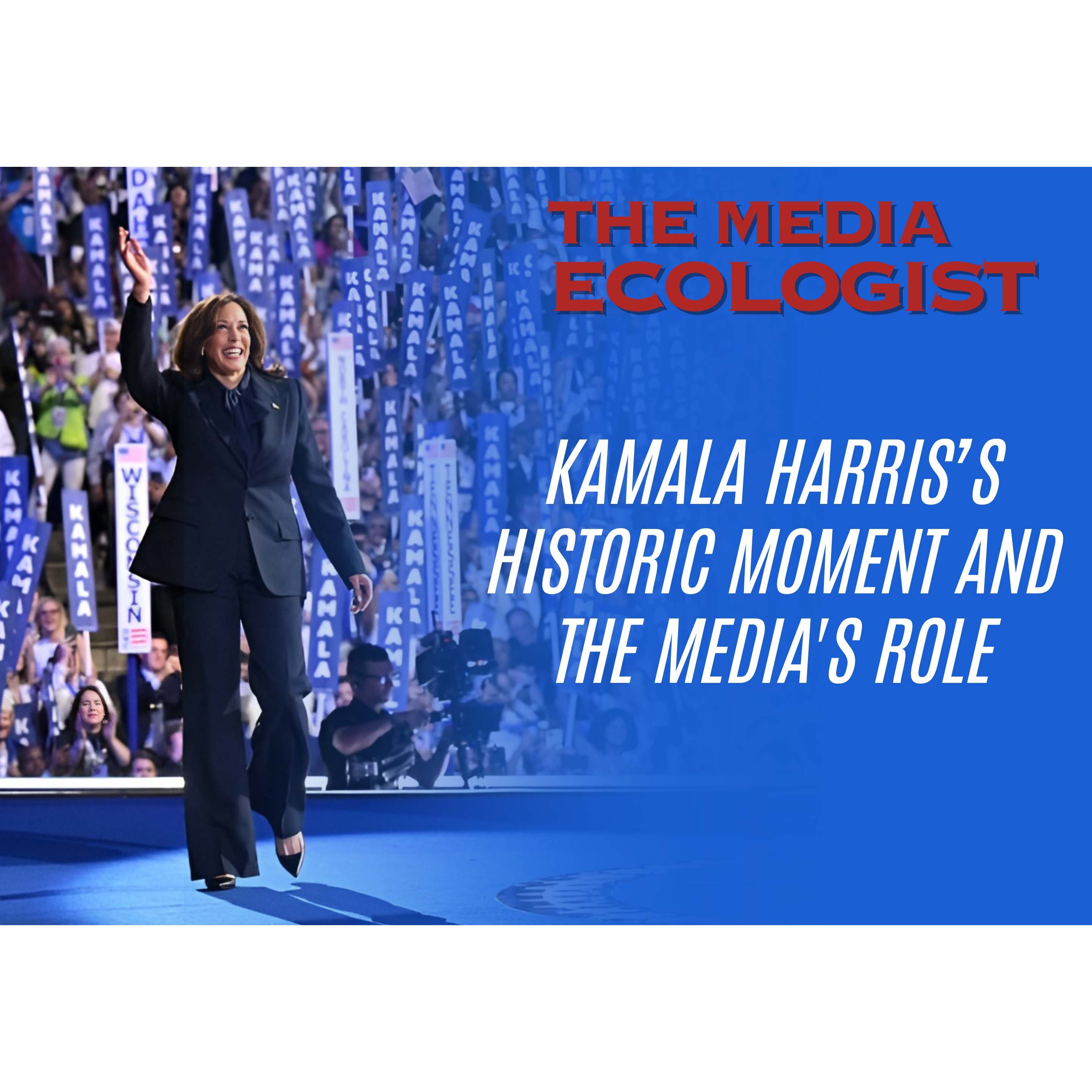The Media Ecologist: Kamala Harris's Historic Moment and the Media's Role

As the 2024 Democratic Convention drew to a close, the nation tuned in with anticipation for Kamala Harris's acceptance speech. It was a moment of profound historical significance -- she is the first Black and South Asian woman to be nominated for the presidency by a major political party. However, while Harris's speech was poised to be the centerpiece of the night, the media's framing and coverage of the event provided a telling lens into the dynamics of modern political communication.
Kamala Harris: A Historic Speech and the Media's Portrayal
Kamala Harris's acceptance speech was a masterclass in political oratory. She effectively navigated the complex terrain of acknowledging her groundbreaking candidacy while addressing the profound challenges facing the nation. Her rhetoric was carefully crafted to resonate with a broad coalition, from the progressive wing of her party to the centrists who are crucial in swing states.
The media, predictably, focused on the historical nature of her candidacy. Headlines in major outlets like The New York Times and CNN underscored her as a trailblazer, drawing parallels to previous groundbreaking moments in American political history. This framing, while appropriate, also came with the risk of reducing her candidacy to mere symbolism rather than focusing on her substantive policy proposals and leadership qualities.
On social media, the response to Harris's speech was overwhelmingly positive, especially among younger voters and minority groups. Hashtags like #MadamPresident and #Kamala2024 trended throughout the night, reflecting the enthusiasm and hope that many feel about her candidacy. There was also a notable undercurrent of skepticism, particularly from the left, where some expressed concerns that her speech did not go far enough in addressing issues like climate change and police reform.
Media as the Architect of Political Narratives
As a media ecologist, I am acutely aware of how the medium shapes the message. In the age of 24/7 news cycles and social media virality, political speeches are no longer just about content -- they are about how that content is framed, disseminated, and consumed by the public. The media's role in shaping the narrative around Harris's speech cannot be understated.
Television coverage of the convention was polished, with networks like MSNBC and ABC providing insightful commentary that highlighted both the historic nature of the event and the strategic importance of Harris's rhetoric. However, there was a clear divergence in how different networks approached the speech. Fox News emphasized what they perceived as Harris's failures to address the concerns of the working class, framing her as an out-of-touch elite. This bifurcation of media narratives is not new, but it underscores the deep polarization in how Americans consume political information.
On social media, the real-time nature of platforms like X and TikTok allowed for immediate reactions and interpretations. Here, we see the democratization of political commentary, where influencers, activists, and ordinary citizens can shape the conversation just as much as traditional journalists. The danger, however, lies in the fragmentation of these narratives. With so many voices contributing to the discourse, it becomes increasingly difficult for any single message to dominate, leading to a cacophony of perspectives that can dilute the intended impact of political communication.
The Evolution of Political Communication
The media landscape of 2024 is vastly different from that of previous election cycles. The rise of TikTok and other digital formats has accelerated the use of video content and the speed at which information is disseminated, but it has also contributed to the erosion of shared narratives. In the past, a candidate's acceptance speech at a national convention would be a defining moment, covered extensively by all major networks and discussed for days, if not weeks. Today, however, the shelf life of such moments is alarmingly short.
Harris's speech, while powerful, is unlikely to dominate the news cycle for long. The media, driven by the need for constant content, will quickly move on to the next story, whether it be a gaffe by a political opponent or the latest viral moment on social media. This relentless pace not only diminishes the impact of political communication but also challenges candidates to constantly innovate in how they engage with the electorate.
The Role of Media in Shaping Democratic Discourse
We must reflect on the role of the media in shaping our democratic discourse. Kamala Harris's acceptance speech was a historic moment, but its legacy will be determined by how it is remembered and retold by the media. The fragmentation of the media landscape means that no single narrative will dominate, leaving the public to piece together their own understanding of this event.
In this environment, the role of the media ecologist becomes ever more critical. We must analyze not just the content of political communication, but the mediums through which it is delivered. The future of our democracy depends on our ability to navigate this complex media ecosystem, ensuring that the messages of our leaders are not lost in the noise, but rather, heard and understood by all.
As we move forward in this election season, let us remain vigilant in our consumption of media, recognizing the power it holds in shaping our perceptions and our politics. Kamala Harris's speech was a historic moment, but its true impact will be determined by how it is mediated, remembered, and acted upon in the weeks and months to come.
This commentary reflects Jack Myers' ongoing exploration of media theory and the intersection of technology, culture, and communication in modern society.
For reviews of nights one, two and three of the Democratic Convention, link here.


